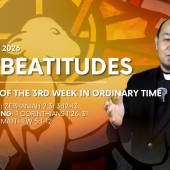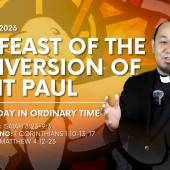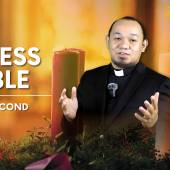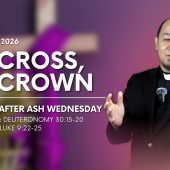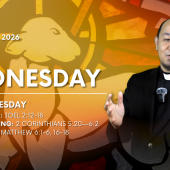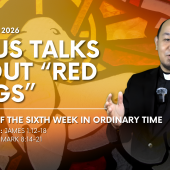Blessed is the ‘Anawim of Yahweh’!

Reflection Date: September 21, 2025 Twenty-fifth Sunday in Ordinary Time
Daily Readings: Amos 8:4-7; 1 Timothy 2:1-8; Luke 16:1-13
The world has always been marked by inequality, between rich and the poor, the powerful and the powerless. Too often, the “haves” exploit the “have-nots,” deepening cycles of poverty rather than lifting the poor out of misery. This issue is as old as humanity itself. Yet throughout Scripture, the God of Israel consistently takes the side of the poor, the oppressed, and the vulnerable. They are called the “anawim of Yahweh”, the poor of the Lord. This expression embraces not only those who are economically and socially marginalized but also the humble and faithful who rely totally on God for deliverance.
The First Reading from the Prophet Amos situates us in the Northern Kingdom of Israel between 786 and 742 BCE, a time of extraordinary material prosperity. Yet prosperity was accompanied by corruption, injustice, and exploitation. Amos, the first of the “classical prophets,” raises his prophetic voice against the hypocrisy of the rich and powerful. He condemns their manipulation of religious festivals, “new moon” and "Sabbath"-as a cover for cheating the poor. Using false measures and weights, they defrauded the vulnerable. Even worse, Amos denounces their inhuman practice of buying the poor for silver and the needy for something as trivial as a pair of sandals. Against such injustices, Amos declares the judgment of God: “The Lord will never forget their deeds.” His message remains strikingly relevant in today’s world, where systems of greed still crush the powerless.
The Responsorial Psalm is a song of praise to God’s greatness and compassion. While God dwells on high, exalted above all nations, He is also the One who stoops down to lift the poor from the dust and raise the needy from the dunghill. The psalmist proclaims that God not only rules in majesty but also acts with tender love for the marginalized, the poor, the humble, and the childless. This psalm beautifully balances God’s transcendence with His immanence, reminding us that divine greatness is inseparable from divine compassion.
The Second Reading, from St. Paul’s First Letter to Timothy, broadens this vision to a universal scale. Paul affirms that God “desires everyone to be saved and to come to the knowledge of the truth.” This inclusivity is emphasized by the repeated use of the word “all.” For Paul, prayer is central to this mission. He urges that supplications, intercessions, and thanksgivings be offered to everyone, kings, rulers, and ordinary people alike. True prayer, he notes, must flow from holy hands and a pure heart, free from anger or divisiveness. Prayer is both gesture and disposition: the outward raising of hands must be matched by inward sincerity.
Paul also proclaims the foundation of Christian faith: there is one God and one mediator between God and humanity, Christ Jesus. He gave Himself as a ransom for all, making salvation universally accessible. Paul speaks of his own vocation as a herald, apostle, and teacher of the Gentiles, entrusted with the mission of proclaiming faith and truth to the nations. His words remind us that our participation in God’s mission begins with prayer but overflows into witness and service.
The Gospel Reading from Luke presents the well-known parable of the dishonest steward. A landowner entrusts his estate to a steward, who is accused of mismanaging resources. Facing dismissal and an audit, the steward reflects on his options, he is too weak to dig and too proud to beg. With clever foresight, he rewrites the accounts of the debtors, reducing their debts: one from a hundred jugs of oil to fifty, another from a hundred measures of wheat to eighty. By foregoing his own commission, he gains the gratitude and friendship of those debtors, securing his future.
Surprisingly, the landowner commends the steward, not for dishonesty, but for his shrewdness. Jesus uses this parable to highlight several lessons:
- Wealth must be used wisely and not hoarded selfishly.
- Eternal values take precedence over material possessions.
- True security lies not in riches but in faithful stewardship.
- One cannot serve both God and money.
- Even small responsibilities must be carried out faithfully.
- What belongs to others, entrusted to us, must be handled with integrity.
- Ultimately, we are called to be “children of light,” living with foresight and fidelity.
The steward’s shrewdness becomes a metaphor for discipleship. Just as he planned wisely for his earthly future, so too must we plan with wisdom for our eternal future, using worldly goods in ways that bear fruit for God’s kingdom.
Taken together, these readings offer a powerful challenge. Amos denounces exploitation, the psalm proclaims God’s compassion, Paul calls for universal prayer, and Jesus reminds us of faithful stewardship. The message is clear: discipleship is not passive. It demands justice, prayer, humility, integrity, and wise use of resources. Above all, it demands that we stand with the poor, live as faithful stewards, and seek eternal treasures that cannot be lost.
Call to Action: Realistic self-assessment is the foundation of the holistic growth of human persons. How aware am I of myself?
Radio Veritas Asia (RVA), a media platform of the Catholic Church, aims to share Christ. RVA started in 1969 as a continental Catholic radio station to serve Asian countries in their respective local language, thus earning the tag “the Voice of Asian Christianity.” Responding to the emerging context, RVA embraced media platforms to connect with the global Asian audience via its 21 language websites and various social media platforms.









